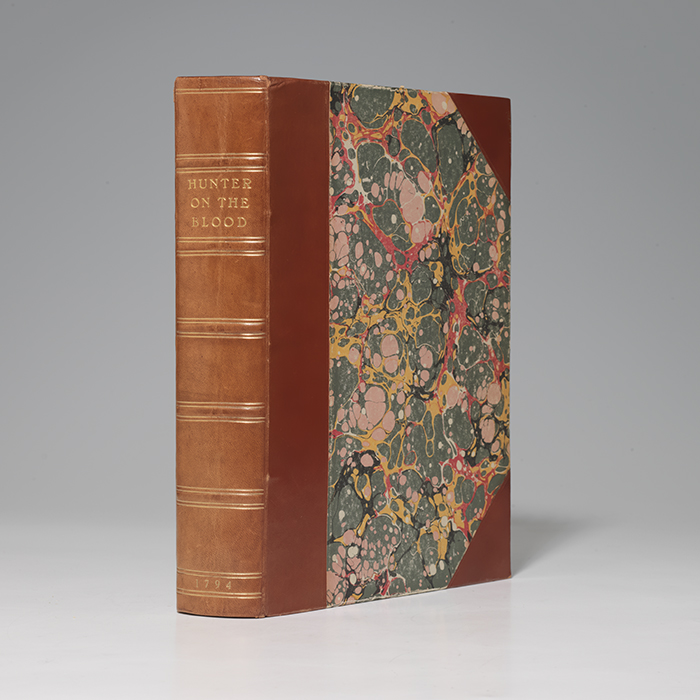
"THE BASIS OF MODERN PATHOLOGY": RARE FIRST EDITION OF HUNTER'S LANDMARK STUDY, A TREATISE ON THE BLOOD, WITH COPPER-ENGRAVED FRONTISPIECE AND NINE COPPER-ENGRAVED PLATES
HUNTER, John. A Treatise on the Blood, Inflammation, and Gun-shot Wounds. London: Printed by John Richardson for George Nicol, 1794. Quarto, 20th-century three-quarter russet morocco, raised bands, marbled boards, uncut. $7800.
First edition of the most important work by John Hunter, pioneering founder of experimental and surgical pathology—"outstanding among 18th-century surgeons for orthopedic surgery"—one of only 992 copies printed, the last work issued from his private press. With frontispiece portrait engraving by W. Sharp after the painting by Joshua Reynolds and nine engraved plates by William Skelton.
"Hunter's Treatise on the Blood is a work of great magnitude" (Grolier Medicine 52). This rare work presents "Hunter's classic observations on inflammation and its curative values, and a description of his famous method of operating by tying the artery above the seat of the disease in aneurism. His new method of applying physiology to practical surgery forms the basis of modern pathology" (Lilly Library 112). "Hunter was ahead of his time in recognizing and describing the three basic factors of wound pathology: first, that an external agent in the air, and not the air itself, is a factor in wound inflammation; second, that a good blood supply is essential in maintaining the natural defenses of the body; and third, that the presence of devitalized tissue in a gunshot or other deep and contused wound prevents the wound from healing and promotes the establishment of sepsis… Hunter's conservative wound management has come under the criticism of medical authorities, but it made sense in the context of 18th-century surgical practice, in which the causes of infection were unknown and antiseptic practices unheard of" (Norman 1122). Hunter based much of his work on his experiences as a surgeon in the British military during the Seven Years' War. "Treatise on the Blood is his most important work… it marked a great advance in knowledge, and for many years it stimulated the progress of surgery, and some of his views have been in recent time found to be truer than the others which supplanted them" (DNB). Hunter died "before the publication of his Treatise, having revised only a third of the proofs; the work was issued posthumously by his nephew Matthew Baillie and his brother-in-law Everard Home. Hunter belongs to the select band of physicians whose books contain descriptions of their own fatal illnesses—in Hunter's case the description, drawn from his own notes, was included by Home in the biography included in the book… Hunter was acknowledged by Rudolf Virchow as the founder of experimental and surgical pathology… He was also outstanding among 18th-century surgeons for orthopedic surgery, and he performed epoch-making studies of the surgical diseases of the vascular system" (Grolier Medicine 52). "Hunter's Treatise was the last work to be issued from his private press at Castle Street: 992 copies of the first edition were printed" (Norman 1122). With copper-engraved frontispiece portrait, often missing, and nine copper-engraved plates: plates I-VIII at rear, the ninth plate bound as issued at page 161. Containing short biography by Everard Home. Osler 1230. Garrison & Morton 2283. ESTC T55638. Owner signature.
Marginal paper repairs to leaf 4D (pp. 569-70) not affecting letterpress. Faint foxing to frontispiece only, mild dampstain to upper margin of a few signatures near rear of text block. A near-fine, attractively bound uncut copy.